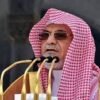WASHINGTON: In a rare and closely watched engagement at the White House, Prime Minister Shehbaz Sharif and Chief of Army Staff Field Marshal Asim Munir met with U.S. President Donald Trump, marking a notable turning point in Pakistan-U.S. relations.
During the hour-long meeting held in the Oval Office on Thursday, Prime Minister Shehbaz expressed high regard for President Trump, commending his “bold leadership” and referring to him as a “man of peace.” According to a statement from the Prime Minister’s Office, Shehbaz credited Trump with helping defuse tensions in South Asia, specifically citing his role in brokering a ceasefire between Pakistan and India following a recent flare-up.
The discussion also covered the crisis in the Middle East. PM Shehbaz praised President Trump’s efforts to halt hostilities in Gaza and acknowledged his initiative to bring together Muslim leaders in New York earlier in the week for a dialogue on peace in the region, particularly concerning Gaza and the West Bank.
Accompanied by Field Marshal Munir, the Prime Minister also thanked Trump for finalizing a favorable tariff arrangement earlier in the year, calling it a significant step in strengthening bilateral economic ties. He extended an open invitation to U.S. investors to explore opportunities in Pakistan’s agriculture, IT, energy, and mineral sectors.
The two leaders discussed regional stability, with a particular focus on counter-terrorism efforts. Shehbaz thanked Trump for recognizing Pakistan’s contributions in fighting terrorism and emphasized the need for enhanced security and intelligence collaboration moving forward.
Images released by the White House show the Pakistani delegation — including the Prime Minister and Field Marshal Munir — engaged in cordial discussions with President Trump, Vice President JD Vance, and Secretary of State Marco Rubio.
President Trump, in remarks to the press prior to the meeting, described PM Shehbaz and COAS Munir as “great leaders,” signaling a clear shift in tone from past U.S. administrations.
Following the meeting, Pakistani Defence Minister Khawaja Asif called 2025 a landmark year for the country, referencing Pakistan’s military success against India, a new defense pact with Saudi Arabia, and now, a revitalized partnership with the United States. He attributed these developments to the strength of Pakistan’s current “hybrid governance model.”
Commenting on the outcome of the meeting, former U.S. Presidential Advisor Shahid Khan noted that Pakistan’s international standing has been significantly elevated. Speaking to Geo News, he said that Islamabad now holds a “permanent seat at the table” due to its strategic posture in South Asia and its balanced diplomacy on Middle East issues, particularly Palestine and Iran.
Security analyst Qamar Cheema described the talks as a shift from traditional security-based cooperation towards geo-economic engagement. He cited Trump’s announcement of upcoming U.S. energy exploration initiatives in Pakistan as a “watershed moment” in bilateral relations.
Geo News journalist Faiz Rehman highlighted Pakistan’s longstanding cultural and trade ties with Iran, noting that these historical bonds place Islamabad in a unique position to act as a stabilizing force in the region. He suggested Trump sees Pakistan as a practical partner on several fronts — diplomacy, trade, and defense — particularly given the shifting dynamics in Asia.
Under President Trump, U.S. policy towards South Asia appears to have taken a strategic turn, moving away from India-centric alignments. Tensions between Washington and New Delhi have risen over trade disagreements, U.S. visa policies, and recent military escalations between India and Pakistan.
Pakistan’s Operation Bunyan-um-Marsoos, launched in response to Indian aggression earlier this year, resulted in the downing of six Indian fighter jets — including three Rafales. The conflict concluded after U.S. mediation led by Trump, who has since been nominated by Islamabad for the Nobel Peace Prize.
The ceasefire helped pave the way for a renewed wave of high-level diplomatic exchanges between Pakistan and the United States, culminating in the recent comprehensive trade deal signed on July 31. Under the agreement, the U.S. imposed a reduced 19% tariff on Pakistani exports — a marked contrast to stalled trade talks with India.
Earlier this year, Field Marshal Munir made history as the first Pakistani military leader to be hosted at the White House without civilian counterparts. U.S. officials later confirmed that counter-terrorism and trade were key agenda items during that visit.
A senior State Department official remarked, “The President remains committed to advancing American interests in the region. That includes close engagement with Pakistan’s leadership, both civilian and military.”
As the geopolitical landscape in Asia continues to evolve, the latest meeting in Washington signals a renewed chapter in Pakistan-U.S. relations — one increasingly shaped by diplomacy, trade, and strategic realignment.



